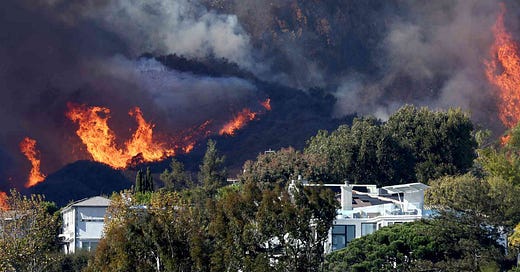There is another huge wildfire in California. In my head, there have been way more of them in recent years and I was curious if it just seemed like that because I’m older and pay attention to the news. So I looked it up, and the data backs up my intuition. The graph below shows the number of acres (in millions) burned by wildfires every year and you can see a scary trend.
I wonder if people realize our actions are causing climate change and environmental degradation, which cause these wildfires. Or are the majority of us just going about our lives, noticing the pattern, and not looking any deeper into it? Anecdotally, most of my family and friends will text updates about who’s evacuating, what landmark is on fire, and how close it is to containment. Maybe everyone assumes it’s an unspoken truth that these tragedies are caused by climate change, but I don’t think that’s the case.
My gut says that most people intuitively understand the link, but quickly discard it from their minds because they don’t think we can do anything about it. That feeling of helplessness comes from the lack of real conversations about climate. Climate delay is the new climate denial. We need to talk more about climate change when these things happen and that starts with the media.
Unfortunately, they are not doing a great job. I did some quick Google searches to compare the number of results for “california wildfire” and “california wildfire + climate change”. I figure this will give a rough idea of how often the wildfires are mentioned in the same breath as the underlying cause.
We can see about 117,000 results for wildfires + climate change compared to 2.5 million for just wildfires alone. So not even 5% of all results mention both wildfires and climate change. I get that you don’t need to mention climate change in all those articles, but I’d expect the percentage to be way higher than 5%. The media has a responsibility to educate people about the forces that shape their lives. Why are they leaving people to figure out the link for themselves when there is already scientific consensus?
Maybe they think it might seem insensitive to talk about anything other than just the fire as it burns people’s houses. I personally think it’s insensitive not to talk about climate change as it relates to these tragedies. People who have lost everything will be angry, sad, and everything in between. Why can’t we name the culprit who took everything from them and try to channel those emotions into action?
There’s also been talk about how we don’t need to feel bad for people living in the Palisades. I disagree with that. Everyone is human and their pain is no less intense than ours. Losing your home is terrible, no matter who you are. With that in mind, they will probably be fine overall (financially) because many of them are wealthier than the average person. But more importantly, we have to remember that the United States and other wealthy nations are almost entirely responsible for the climate crisis. Estimates show that even though the U.S. only makes up around 4% of the world’s population, we’re responsible for 40% of the excess carbon emissions.
Since most of the damage from climate change will be done to much poorer countries in the Global South, we have a unique opportunity in California. We are experiencing the consequences of our actions firsthand. This can be a powerful force to change behavior.
But change will only happen if we acknowledge climate change as the cause of our problems and more importantly, talk about what we’re going to do to fix it. With a gentle nudge, the actors and musicians who lost their homes might end up trying to reduce their carbon emissions or talk about climate change in their work. By bringing climate change into the forefront of conversations about extreme weather events we just might be able to create some change.







